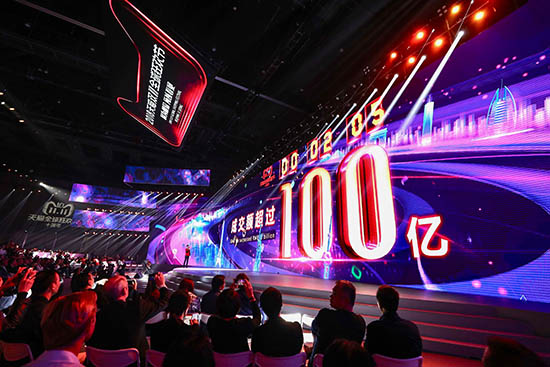“双十一”销售额再创记录,已成为中国经济风向标
在经济降温、市场饱和,以及来自京东和拼多多等较小平台的竞争日渐激烈之际,阿里巴巴正在寻找新的增长引擎。

|
在阿里巴巴一年一度的“双十一”购物狂欢节中,全球购物者蜂拥而至,这家在线商务巨头实现了2,135亿元(合307亿美元)的销售额,创下历史纪录。 这家中国最大的公司请来太阳马戏团(Cirque du Soleil)和玛丽亚·凯莉,利用直播晚会来推广这场活动。阿里巴巴宣布,小米公司、苹果公司和戴森公司的产品位列预售活动销售榜前三甲。 这个原本专门针对中国单身一族的零售庆典,如今不仅已成为阿里巴巴公司的一个重要的风向标,甚至对中国也是如此。在中国与美国的紧张局势和针尖对麦芒的关税战争让股市陷入了低迷、并有可能对中国这个全球第二大的经济体造成威胁之际,今年的“双十一”购物狂欢让人们得以一窥中国消费者的信心。 据阿里巴巴网站新闻公布,“双十一”开始还不到两小时,阿里巴巴的销售额就突破了1000亿元大关。 亿万富翁马云和他的副手张勇面临的挑战是,在“双十一”经历了十年的骄人战绩后,还要再创新创。在经济降温、市场饱和,以及来自京东和拼多多等较小平台的竞争日渐激烈之际,阿里巴巴正在寻找新的增长引擎。 天猫总裁靖捷在“双十一”活动上表示:“阿里巴巴正在利用所有平台,把‘双十一’变成一个包括餐饮和娱乐在内的节日……我们将在线购物与线下实体店联结了起来。”天猫是阿里巴巴的主要购物网站之一。 “双十一”购物节是马云和张勇共同创立的,十年前张勇提出了把这个非传统节日变成一场购物狂欢的想法。“双十一”首先在大学生中流行,它作为情人节情意绵绵的情感的解毒剂而出现。其名字来源于这个日期以阿拉伯数字来写是“11/11”,形如“光棍”,这是中国对单身人士的称谓。现在,它已经成为人们在这一天购物、吃饭和狂欢的借口。它的规模越来越大——阿里巴巴预计今年将有10亿件包裹被运送出去——以至于包装废弃物对环境的潜在损害仍然是一个挥之不去的问题。 张勇将于明年从即将退休的马云手中接过董事局主席一职。他必须证明自己能够将这一传统传承下去。这家在杭州的公司也将利用这一机会来测试其云计算、物流和支付业务的极限。 尽管如此,今年仍存在一些不确定性,因为贸易战和资产价值缩水可能会破坏经济增长。中国国家统计局的数据显示,今年第三季度中国网络零售额增长放缓至24%,比前一季度下降了12个百分点。 马云三年前曾说,他想让“双十一”成为一个全球性的现象。国际扩张将是张勇能否打破纪录的关键。去年,“双十一”排在前三名的非中国大陆市场依次是俄罗斯、香港和美国。在海外,热销商品包括手机、羊毛外套和针织毛衣。 在今年“双十一”的第一个小时,对中国销售商品最多的国家是日本、美国和韩国,而从海外购买的最多的商品是服饰、羊毛外套、裤子和连帽衫。 与此同时,阿里巴巴进军美国的努力也出现了问题。公司放弃了在美国创造100万个就业岗位的承诺,其在美国的顶尖交易人离职,其附属公司蚂蚁金服(Ant Financial)也放弃了收购美国速汇金(MoneyGram)的计划。美国总统唐纳德·特朗普在10月中旬表示,美国将计划从一项有192个国家缔约的国际条约中撤出。根据该条约的规定,中国企业向美国消费者发送小型包裹时,可以享受邮费折扣,美国退出后将加大中国商户进入美国市场的难度。 东南亚将是阿里巴巴表明自己有能力走向全球的市场。目前,总部位于新加坡的Lazada已被阿里巴巴纳入旗下,在中国经济增长放缓、贸易战升级引发动荡的背景下,这个地区仍然是该集团的亮点之一。(财富中文网) 译者:冉文忠 |
Alibaba Group Holding Ltd. logged 213.5 billion yuan ($30.7 billion) in sales for its annual Singles’ Day extravaganza, setting a record as shoppers swarmed the e-commerce giant’s online bazaars. China’s largest company, which used a concurrent televised entertainment spectacle featuring Cirque du Soleil and Mariah Carey to further drum up business, reported that Xiaomi Corp., Apple Inc. and Dyson Ltd. products were the top three brands in early sales. The annual retail celebration, originally dedicated to the nation’s unattached, has become an important bellwether not just for the company, but also the country. This year’s Nov. 11 gala offers a glimpse of consumer sentiment in China as U.S. tensions and a tit-for-tat tariff war depress stock markets and threaten to dampen the world’s No. 2 economy. Alibaba surpassed the 100 billion yuan mark less than two hours into Singles’ Day, according to Alibaba’s news website. The challenge for billionaire Jack Ma and his lieutenant Daniel Zhang was to notch another record after a scorching decade-long run. With a cooling economy, saturated markets and competition from smaller platforms such as JD.com Inc. and Pinduoduo Inc., Alibaba is seeking new growth engines. “Alibaba is making use of all of its platforms to make Singles’ Day a holiday that also includes dining and entertainment,” Jet Jing, president of Tmall, one of the company’s main sites, said at the Singles’ Day event. “We’re connecting online shopping with offline physical outlets.” Singles’ Day was the brainchild of co-founder Ma and Zhang, who came up with the idea of turning the counter-cultural holiday into a shopfest a decade ago. First popularized by college students, Nov. 11 emerged as an antidote to the sentimentality of Valentine’s Day. It takes its name from the way the day is written numerically as 11/11, which resembles “bare branches,” a local expression for the unattached. Now, it’s become an excuse for people to shop, eat and binge on entertainment shows. It’s become so enormous that packaging waste—Alibaba expects 1 billion packages to get shipped this year—and potential damage to the environment remain lingering issues. The chief executive, who takes over from a retiring Ma as chairman next year, must prove he can carry on that legacy. His Hangzhou-based company also uses the occasion to test the limits of its cloud computing, delivery and payments units. Still, there was some uncertainty this year, as the trade war and deflating asset values threaten to disrupt economic growth. Chinese online retail sales growth slowed to 24 percent in the third quarter, down 12 percentage points from the previous three months, according to the National Bureau of Statistics. It’s been three years since Ma said he wants to make Singles’ Day a global phenomenon. International expansion will be a key plank of Zhang’s effort to keep breaking records. Last year, the top three non-Chinese Singles’ Day markets were Russia, tiny Hong Kong and the U.S.—in that order. Popular items purchased overseas included mobile phones, wool coats and knitted sweaters. In the first hour of this year’s Singles’ Day, the top countries selling to China were Japan, the U.S. and South Korea, and the most popular items purchased overseas were dresses, wool coats, pants and hoodies. At the same time, Alibaba’s efforts to push into the U.S. are sputtering. It discarded a pledge to create a million jobs in the country, lost its top American dealmaker, and jettisoned plans for affiliate Ant Financial to acquire MoneyGram. President Donald Trump said in mid-October he plans to withdraw the U.S. from a 192-nation treaty that gives Chinese companies discounted shipping rates for small packages sent to American consumers, making it harder for Chinese merchants to push into the market. Southeast Asia will give the clearest indication of Alibaba’s ability to go global. With Singapore-based Lazada now fully under its wing, the region remains one of the company’s relative bright spots, amid a backdrop of slowing growth in China and turmoil brought on by the escalating trade war. |













